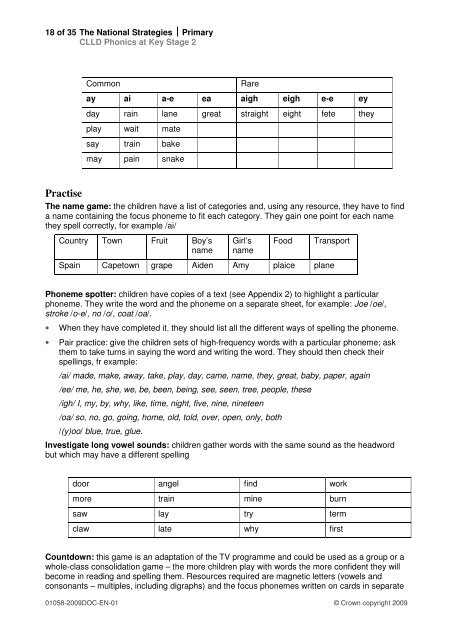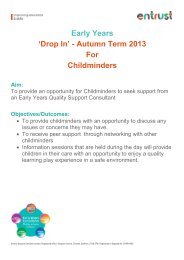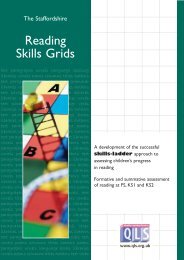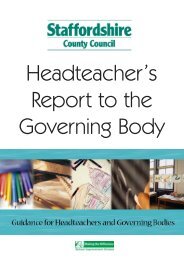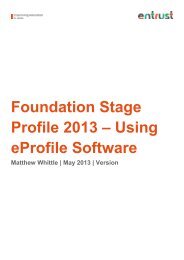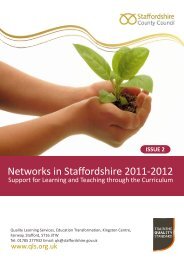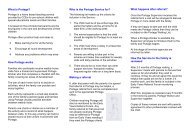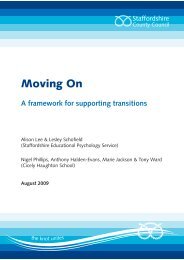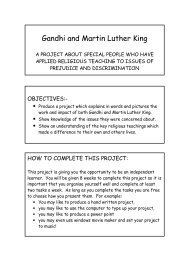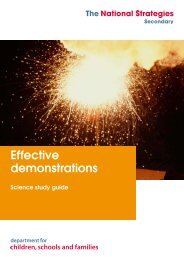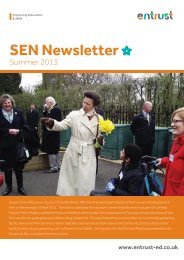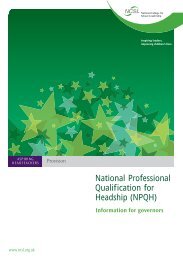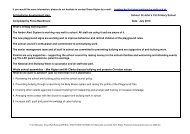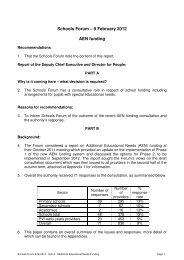CLLD Phonics at Key Stage 2 - School-Portal.co.uk
CLLD Phonics at Key Stage 2 - School-Portal.co.uk
CLLD Phonics at Key Stage 2 - School-Portal.co.uk
Create successful ePaper yourself
Turn your PDF publications into a flip-book with our unique Google optimized e-Paper software.
18 of 35 The N<strong>at</strong>ional Str<strong>at</strong>egies ⏐ Primary<br />
<strong>CLLD</strong> <strong>Phonics</strong> <strong>at</strong> <strong>Key</strong> <strong>Stage</strong> 2<br />
Common Rare<br />
ay ai a-e ea aigh eigh e-e ey<br />
day rain lane gre<strong>at</strong> straight eight fete they<br />
play wait m<strong>at</strong>e<br />
say train bake<br />
may pain snake<br />
Practise<br />
The name game: the children have a list of c<strong>at</strong>egories and, using any resource, they have to find<br />
a name <strong>co</strong>ntaining the focus phoneme to fit each c<strong>at</strong>egory. They gain one point for each name<br />
they spell <strong>co</strong>rrectly, for example /ai/<br />
Country Town Fruit Boy’s<br />
name<br />
Girl’s<br />
name<br />
Food Transport<br />
Spain Capetown grape Aiden Amy plaice plane<br />
Phoneme spotter: children have <strong>co</strong>pies of a text (see Appendix 2) to highlight a particular<br />
phoneme. They write the word and the phoneme on a separ<strong>at</strong>e sheet, for example: Joe /oe/,<br />
stroke /o-e/, no /o/, <strong>co</strong><strong>at</strong> /oa/.<br />
• When they have <strong>co</strong>mpleted it, they should list all the different ways of spelling the phoneme.<br />
• Pair practice: give the children sets of high-frequency words with a particular phoneme; ask<br />
them to take turns in saying the word and writing the word. They should then check their<br />
spellings, fr example:<br />
/ai/ made, make, away, take, play, day, came, name, they, gre<strong>at</strong>, baby, paper, again<br />
/ee/ me, he, she, we, be, been, being, see, seen, tree, people, these<br />
/igh/ I, my, by, why, like, time, night, five, nine, nineteen<br />
/oa/ so, no, go, going, home, old, told, over, open, only, both<br />
/(y)oo/ blue, true, glue.<br />
Investig<strong>at</strong>e long vowel sounds: children g<strong>at</strong>her words with the same sound as the headword<br />
but which may have a different spelling<br />
door angel find work<br />
more train mine burn<br />
saw lay try term<br />
claw l<strong>at</strong>e why first<br />
Countdown: this game is an adapt<strong>at</strong>ion of the TV programme and <strong>co</strong>uld be used as a group or a<br />
whole-class <strong>co</strong>nsolid<strong>at</strong>ion game – the more children play with words the more <strong>co</strong>nfident they will<br />
be<strong>co</strong>me in reading and spelling them. Resources required are magnetic letters (vowels and<br />
<strong>co</strong>nsonants – multiples, including digraphs) and the focus phonemes written on cards in separ<strong>at</strong>e<br />
01058-2009DOC-EN-01 © Crown <strong>co</strong>pyright 2009


